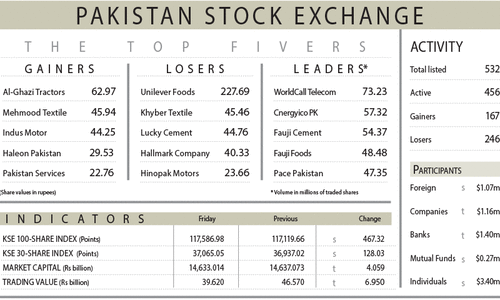KARACHI, May 23: The interim monetary policy would reduce banks profit by 20-30 per cent, and a total liquidity of Rs62 billion would go out of the banking system, said analysts.
The sudden announcement of major decisions by the State Bank of Pakistan (SBP) — raise in discount rate by 1.5 per cent, hike in Cash Reserve Ratio and Statutory Liquidity Ratio and fixation of minimum slab for rate of return on deposits — jolted the banking sector and the money market.
Analysts expected low credit growth in the wake of high interest rates which, they said, would reduce interest income of banks.
At the same time, the cost of fund has substantially increased and five major banks would receive the biggest blow.
The five major banks that have approximately 55 per cent of the total banking have been paying the lowest returns on deposits.
Analysts calculated that these banks were paying an average of two to 2.5 per cent to their depositors.
“The fixation of a minimum five per cent return on deposits is shocking for big banks and the cost of fund may reduce the entire banking sector profits by 20-30 per cent,” said Mohammad Imran, head of research at First Capital Equity.
On Dec 2007, 36 per cent of listed commercial banks’ deposits were in the saving accounts.
He said banks would face double negative impact as decline of high cost credit would bring low interest income for banks.
Calculations showed that the SBP would suck up Rs62bn from the banking system with the increase of one per cent CRR and SLR.
However, the expected increase in treasury bills would bring liquidity up to Rs30 billion back into the market.
“A higher discount rate and reserve ratios should make room in the market for the SBP to offload debt of the government to scheduled banks and make auction of T-Bills more attractive for commercial banks as most recent auctions have met with a poor response,” said Farhan Rizvi, a researcher at JS Company.
The SBP showed frustration over huge government borrowing which collectively reached 9.4 per cent of the GDP and financed 80 per cent the current budget.
The hike in discount rate would involve commercial banks to share debt burden with the SBP.
Analysts expect Kibor (Karachi Inter-Bank Offered Rate) to increase by 40-60bps, while Treasury bills could rise by 50-70bps as a result of the discount rate increase.
The Kibor rates have already risen by more than 90bps during May 2008 in anticipation of a discount rate hike.
“T-Bills cut-off is likely to increase more than the Kibor’s as one of the major purposes of the monetary tightening is to encourage greater participation of scheduled banks in T-Bill auctions,” said Mr Rizvi.
He said the increase in deposit rates on saving accounts (approximately 43 per cent of total banking deposits) to a minimum of five per cent is likely to increase cost of deposits for the industry by 125bps to 4.26 per cent from previous three per cent.
Analysts believe that the increase in LC margins would have a very nominal impact on the banking sector as it would only hurt fee-based income of the bank.
As a matter of the fact, in fee income of the banks, now the share of consumer-based income and from other sources is increasing.
Therefore, reduction in fee income from LC business would not hurt the profitability notably.
The real impact could result into lowering of import bills, they said.













































Dear visitor, the comments section is undergoing an overhaul and will return soon.